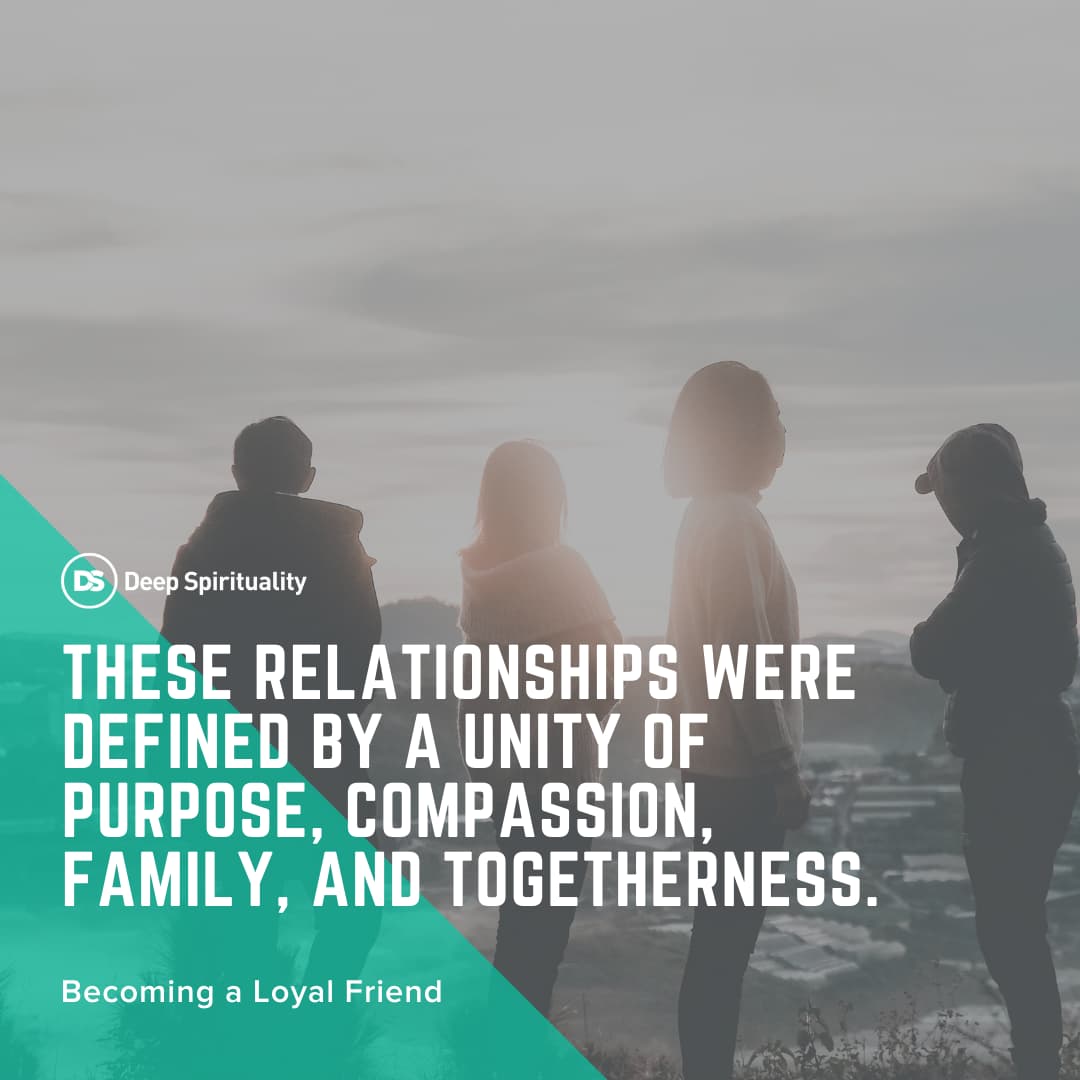Note:
This devotional is part of a series entitled “How Ordinary People Become Extraordinary: Lessons from the Book of Acts.”
They devoted themselves to the apostles’ teaching and to fellowship, to the breaking of bread and to prayer. [43] Everyone was filled with awe at the many wonders and signs performed by the apostles.
[44] All the believers were together and had everything in common. [45] They sold property and possessions to give to anyone who had need. [46] Every day they continued to meet together in the temple courts. They broke bread in their homes and ate together with glad and sincere hearts, [47] praising God and enjoying the favor of all the people. And the Lord added to their number daily those who were being saved. Acts 2:42-47 NIV
The church began in Jerusalem where 3,000 Jews representing every nation on earth had come to celebrate the day of Pentecost.
They heard and responded to the gospel message and were baptized. These new Christians were fueled by their devotion to God and each other, creating an awe-inspiring presence.
Although the church was culturally, racially, and economically diverse, it built and encompassed an environment of rich and meaningful relationships. These relationships were defined by a unity of purpose, compassion, family, and togetherness, which was in stark contrast to the prevailing environment of Jerusalem at the time.
It was no wonder people were attracted to the church, adding people to their numbers every day.
I started attending church services as a freshman in college at University of Florida. I had just moved into the dorms and my roommate told me about a guy who came by and invited him to church. He put a pin in the map of the city we were in to show him where the church was.

I had come from California and my roommate was from Pennsylvania. Both of us were new to our campus so we had a map on the wall to learn how to get around.
I decided to give church a try so I rode my bike there and, like most college students, arrived late. I had hoped to slip in unnoticed but by being late, the only seats left in the auditorium were on the front row. An usher walked me down to the front row of a packed house. (I’ll just call that a walk of shame).
I was immediately impressed by how full it was. The group was diverse with many young people there, they seemed to be very happy, and the singing was quite good – all things that were lacking in my personal experience with church.
The lesson happened to keep my attention, and before I knew it we had an intermission (at least that is what I thought). Church service was actually over but everyone was hanging around talking, and I had not seen that before.

In my past church, at the end of the last song, people bolted for the door. In fact the two ministry staff men would head to the door during the last song so they could shake hands with everyone as they were leaving.
I remember being asked how I had come to be at church, and I told them I lived in Yon Hall (the athletes’ dorm) as my roommate and I were on the wrestling team. Though I only remembered part of the name of the guy who invited my roommate, they immediately knew who I was talking about, since he was a track athlete and had been a national champion the previous year.
They assured me that he would want to meet me. I felt pretty sure he would have no reason to want to meet me but humored them. They introduced us, and I was impressed with the interest he showed in becoming a friend. I came every week after that and have never left.
Every Christian should experience the same rich and meaningful relationships that defined the first-century church. What was the foundation for their success? What motivated them to create and sustain the kind of relationships that attracted so many people to want to be with them?
They devoted themselves to the apostles’ teaching and to fellowship, to the breaking of bread and to prayer.
Acts 2:42 NIV
The first characteristic the Bible describes in the first-century church is their devotion.
Merriam Webster Dictionary defines devotion as “the fact or state of being ardently dedicated and loyal.” (ardent: characterized by warmth of feeling typically expressed in eager zealous support or activity: 2) fiery hot).
Let’s talk about the four areas of devotion these early Christians were known for.
1. Devoted to the apostles’ teaching
So now you Gentiles are no longer strangers and foreigners. You are citizens along with all of God’s holy people. You are members of God’s family. [20] Together, we are his house, built on the foundation of the apostles and the prophets. And the cornerstone is Christ Jesus himself.
[21] We are carefully joined together in him, becoming a holy temple for the Lord. [22] Through him you Gentiles are also being made part of this dwelling where God lives by his Spirit. Ephesians 2:19-22 NLT
The Bible is a collection of the teachings of the Old Testament prophets and the New Testament apostles with Jesus as the cornerstone. So Acts 2:42 is telling us that the first century church was devoted to God’s Word.
This is my second letter to you, dear friends, and in both of them I have tried to stimulate your wholesome thinking and refresh your memory. [2] I want you to remember what the holy prophets said long ago and what our Lord and Savior commanded through your apostles.
2 Peter 3:1-2 NLT
The apostles’ teachings remind us what Jesus commanded – to love one another.
So now I am giving you a new commandment: Love each other. Just as I have loved you, you should love each other. [35] Your love for one another will prove to the world that you are my disciples.”
John 13:34-35 NLT
God created us with relationships in mind and wanted the hallmark of our relationships to be love.
Our natural state is to desire intimacy through our relationship with God and one another. God taught us how to build relationships by sharing with us the details of his relationship with his people in the Old Testament and then through his Son Jesus in the New Testament. Because the first-century church was devoted first to God, they became great relationship builders.
I’d like to think everyone in the church must have been friendly, had attractive personalities, and was friendly so it was easy for everyone to get along. Then all my relationship challenges could conveniently be blamed on all those unfriendly, personality challenged and unlikable people God has unfairly put in my life rather than on me.
We will become better at relationships when our focus is on imitating how Jesus loved us.
I’m being facetious of course, but we’d all like to believe that, right?
In reality, relationships are hard because we all have personal sins, character flaws and mindset traps that cause relationship dysfunctions.
Jesus loved the unlovable (Mark 1:40-42), the uncontrollable (Mark 5:1-13), the immoral (Luke 7:36-48) and the obstinate (Luke 13:34-35). Jesus was patient with the distracted (Luke 10:38:42) and the critical (Luke 15:1-7). He reached out to the notorious (Luke 19:1-10 NLT), and wept over the lost (Luke 19:41-44).
Then Jesus commanded that we love one another and exemplified this through his life as the standard for us to live up to. We will become better at relationships when our focus is on imitating how Jesus loved us, not on the flaws of the people God has put in our life.
Pause and reflect
- How much am I devoted to putting the Bible into practice in my relationships?
- What scriptures should I focus on to change my heart toward people I struggle to care for?
2. Devoted to the fellowship
Therefore, brothers and sisters, since we have confidence to enter the Most Holy Place by the blood of Jesus, [20] by a new and living way opened for us through the curtain, that is, his body, [21] and since we have a great priest over the house of God, [22] let us draw near to God with a sincere heart and with the full assurance that faith brings, having our hearts sprinkled to cleanse us from a guilty conscience and having our bodies washed with pure water.
[23] Let us hold unswervingly to the hope we profess, for he who promised is faithful. [24] And let us consider how we may spur one another on toward love and good deeds, [25] not giving up meeting together, as some are in the habit of doing, but encouraging one another—and all the more as you see the Day approaching. Hebrews 10:19-25 NIV
Fellowship is the act of engaging in relationships for mutual edification. This scripture shows us the natural progression toward relationships when our thoughts begin with God, and it defines the goals for fellowship.
While reminding us of the confidence we should have because of the blood of Jesus, this scripture defines four responses we should have as a result:
- To draw near to God (because of the confidence we have in him)
- To hold tightly to hope (because of God’s promises)
- To consider how to spur others on toward love and good deeds
- To not give up meeting together (rather encourage one another)
These qualities are reminiscent of the kind of deep and meaningful relationships displayed by the early Christians that were described in Acts 2. They had a strong devotion to being together to spur one another on toward love and good deeds rooted in their shared focus on God and response to the cross.
Too many have lost their conviction that fellowship is an extension of our walk with God.
Too many have lost their conviction that fellowship is an extension of our walk with God. When we value God, we will value fellowship. God works through fellowship to encourage and build up his family.
When we treat fellowship as optional, we’ve lost sight of God’s express command to encourage one another. Fellowship is how we fulfill that command and also how we get our own needs met.
Pause and reflect
- Do you see God’s command to love one another as Jesus loved us as part of your response to the cross?
- Do you see fellowship as an expression of our love for God? Do you feel an obligation to encourage others as part of your gratitude for the sacrifice on the cross made on your behalf?
- How should this scripture influence your thinking about fellowship opportunities?
3. Devoted to the breaking of bread
For I pass on to you what I received from the Lord himself. On the night when he was betrayed, the Lord Jesus took some bread [24] and gave thanks to God for it. Then he broke it in pieces and said, “This is my body, which is given for you. Do this in remembrance of me.”
[25] In the same way, he took the cup of wine after supper, saying, “This cup is the new covenant between God and his people—an agreement confirmed with my blood. Do this in remembrance of me as often as you drink it.” [26] For every time you eat this bread and drink this cup, you are announcing the Lord’s death until he comes again. 1 Corinthians 11:23-26 NLT
There is a reason the Bible commands us to remember the cross through our communion service each week.
Everything starts with God’s response to our sin. The blood shed for our forgiveness should compel us to want to respond with gratitude (Luke 7:36-48, 2 Corinthians 5:14 NIV).
What should our gratitude look like?
This is how we know what love is: Jesus Christ laid down his life for us. And we ought to lay down our lives for our brothers and sisters.
1 John 3:16 NIV
Our gratitude should be shown in our heart to sacrifice for others. God wants the love he shared with us to be shared with others.
The first time I attended church I was a lowly freshman walk-on wrestler and my friend Scott was a reigning NCAA champion in the javelin.
There was no reason Scott should have given me the time of day except that he was motivated by something other than what I could contribute to the relationship. He was motivated by God and that inspired him to share that with me by pointing me toward God.
Pause and reflect
- Have you evaluated lately what your primary motivation has been? Promotion or preservation of self? Avoiding Stress? People? Or God’s grace and love in your life?
- What relationship can you point to that demonstrates gratitude toward God?
- Pray about the people God has put in your life. Who do you need to reach out to and care about?
4. Devoted to prayer
Every time I think of you, I give thanks to my God. [4] Whenever I pray, I make my requests for all of you with joy, [5] for you have been my partners in spreading the Good News about Christ from the time you first heard it until now. [6] And I am certain that God, who began the good work within you, will continue his work until it is finally finished on the day when Christ Jesus returns.
[7] So it is right that I should feel as I do about all of you, for you have a special place in my heart. You share with me the special favor of God, both in my imprisonment and in defending and confirming the truth of the Good News. [8] God knows how much I love you and long for you with the tender compassion of Christ Jesus. [9] I pray that your love will overflow more and more, and that you will keep on growing in knowledge and understanding. [10] For I want you to understand what really matters, so that you may live pure and blameless lives until the day of Christ’s return. [11] May you always be filled with the fruit of your salvation—the righteous character produced in your life by Jesus Christ— for this will bring much glory and praise to God. Philippians 1:3-11 NLT
Our prayer life is a great indicator of what’s on our hearts and minds.
Paul’s care and concern for people is demonstrated in his commitment to praying for them. At the same time, his prayer life demonstrates how special a place people held in his heart.
I’m convicted by Paul’s prayer life and recognize how easily my own anxiety and personal desires drive people out of my heart and my prayer life.
It’s clear that praying for people moves our hearts and endears people to us. It’s not surprising then that the first century church, known for their devotion to prayer, was also known for being family and having relationships that attracted people to be part of the church.
Devotion to prayer will keep our hearts relationship-focused. And just as it did for the early disciples, prayer will fuel our passion to live for and pursue God’s purpose.
Pause and reflect
- Are you devoted to prayer? If not, what are you devoted to?
- What or who occupies your heart and mind?
- Who should be on your heart and mind to pray for?
Explore the series
- Introduction
- Part 1: Need Emotional Strength? Here’s How Prayer Can Help.
- Part 2: Be Teachable: How a Heart for God Should Make You a Learner
- Part 3: How Devotion to God Makes You a Loyal Friend
- Part 4: How to Make Turning to God a Lifestyle and Not An Event
- Part 5: How God Uses Ordinary People To Do The Unexpected
- Part 6: Unstoppable Faith: The Power of Knowing God’s Purpose for Me
- Part 7: 5 Practical Ways Everyone Can Be a Spiritual Leader
Explore more:
Stone Eleazer studied at the University of Florida and is an editor for Deep Spirituality.
Stone Eleazer studied at the University of Florida and is an editor for Deep Spirituality.





